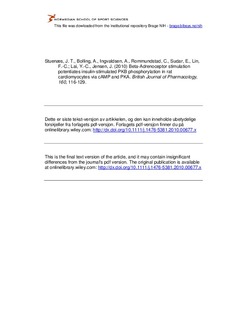Beta-Adrenoceptor stimulation potentiates insulin-stimulated PKB phosphorylation in rat cardiomyocytes via cAMP and PKA
Stuenæs, Jorid T.; Bolling, Astrid; Ingvaldsen, Ada; Rommundstad, Camilla; Sudar, Emina; Lin, Fang-Chin; Lai, Yu-Chiang; Jensen, Jørgen
Journal article, Peer reviewed
Permanent lenke
http://hdl.handle.net/11250/170805Utgivelsesdato
2010-03-23Metadata
Vis full innførselSamlinger
- Artikler / Articles [2096]
Originalversjon
British Journal of Pharmacology. 2010, 160(1), 116-129Sammendrag
BACKGROUND AND PURPOSE: Genetic approaches have documented protein kinase B (PKB) as a pivotal regulator of heart function. Insulin strongly activates PKB, whereas adrenaline is not considered a major physiological regulator of PKB in heart. In skeletal muscles, however, adrenaline potentiates insulin-stimulated PKB activation without having effect in the absence of insulin. The purpose of the present study was to investigate the interaction between insulin and beta-adrenergic stimulation in regulation of PKB phosphorylation.
EXPERIMENTAL APPROACH: Cardiomyocytes were isolated from adult rats by collagenase, and incubated with insulin, isoprenaline, and other compounds. Protein phosphorylation was evaluated by Western blot and phospho-specific antibodies.
KEY RESULTS: Isoprenaline increased insulin-stimulated PKB Ser(473) and Thr(308) phosphorylation more than threefold in cardiomyocytes. Isoprenaline alone did not increase PKB phosphorylation. Isoprenaline also increased insulin-stimulated GSK-3beta Ser(9) phosphorylation approximately twofold, supporting that PKB phosphorylation increased kinase activity. Dobutamine (beta(1)-agonist) increased insulin-stimulated PKB phosphorylation as effectively as isoprenaline (more than threefold), whereas salbutamol (beta(2)-agonist) only potentiated insulin-stimulated PKB phosphorylation by approximately 80%. Dobutamine, but not salbutamol, increased phospholamban Ser(16) phosphorylation and glycogen phosphorylase activation (PKA-mediated effects). Furthermore, the cAMP analogue that activates PKA (dibutyryl-cAMP and N(6)-benzoyl-cAMP) increased insulin-stimulated PKB phosphorylation by more than threefold without effect alone. The Epac-specific activator 8-(4-chlorophenylthio)-2'-O-methyl-cAMP (007) increased insulin-stimulated PKB phosphorylation by approximately 50%. Db-cAMP and N(6)-benzoyl-cAMP, but not 007, increased phospholamban Ser(16) phosphorylation.
CONCLUSIONS AND IMPLICATIONS: beta-adrenoceptors are strong regulators of PKB phosphorylation via cAMP and PKA when insulin is present. We hypothesize that PKB mediates important signalling in the heart during beta-adrenergic receptors stimulation.
Beskrivelse
I Brage finner du siste tekst-versjon av artikkelen, og den kan inneholde ubetydelige forskjeller fra forlagets pdf-versjon. Forlagets pdf-versjon finner du på onlinelibrary.wiley.com: http://dx.doi.org/10.1111/j.1476-5381.2010.00677.x / In Brage you'll find the final text version of the article, and it may contain insignificant differences from the journal's pdf version. The original publication is available at onlinelibrary.wiley.com: http://dx.doi.org/10.1111/j.1476-5381.2010.00677.x
